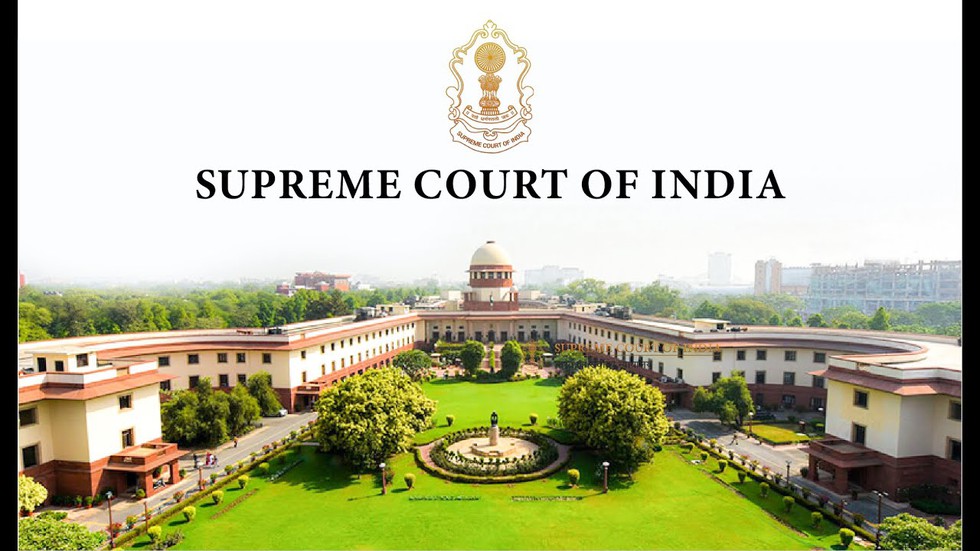About Supreme Court of India (SC):
- History:
- The Supreme Court of India is the apex judicial body under the Constitution of India.
- Article 124 of the Constitution states that “There shall be a Supreme Court of India.”
- The Supreme Court came into existence on January 26, 1950, with the coming into force of the Constitution.
- On January, 28, 1950, two days after India became a Sovereign Democratic Republic, the Supreme Court was inaugurated.
- The Supreme Court initially functioned from the old Parliament House till it moved to the present building located on Tilak Marg, New Delhi, in 1958.
- The first President of India, Dr. Rajendra Prasad, inaugurated the present building of the Supreme Court of India on August 4, 1958.
- Number of Judges:
- The original Constitution of 1950 envisaged a Supreme Court with a Chief Justice and 7 puisne Judges, leaving it to Parliament to increase this number.
- Considering the increase in workload, Parliament increased the number of Judges from 8 in 1950 to 11 in 1956, 14 in 1960, 18 in 1978, 26 in 1986, 31 in 2009, and 34 in 2019 (current strength).
- Today, the judges sit in benches of two and three and come together in larger benches of 5 and more (Constitution Bench) to decide any conflicting decisions between benches of the Supreme Court or any substantial questions concerning the interpretation of the Constitution.
- The proceedings of the Supreme Court are conducted in English.
- Powers and Functions:
- The Supreme Court has original, appellate, and advisory jurisdiction.
- It serves both as the final court of appeals and the final interpreter of the Constitution.
- Its exclusive original jurisdiction extends to any dispute between the Government of India and one or more States or between the Government of India and any State or States on one side and one or more States on the other, or between two or more States, if and insofar as the dispute involves any question (whether of law or fact) on which the existence or extent of a legal right depends.
- In addition, Article 32 of the Constitution gives extensive original jurisdiction to the Supreme Court for the enforcement of Fundamental Rights.
- It is empowered to issue directions, orders, or writs, including writs in the nature of habeas corpus, mandamus, prohibition, quo warranto, and certiorari, to enforce them.
- The Supreme Court has been conferred with the power to direct the transfer of any civil or criminal case from one High Court to another High Court or from a Court subordinate to another High Court.
- Under the Arbitration and Conciliation Act, 1996, International Commercial Arbitration can also be initiated in the Supreme Court.
- The appellate jurisdiction of the Supreme Court can be invoked by a certificate granted by the High Court concerned under Article 132(1), 133(1) or 134 of the Constitution in respect of any judgement, decree, or final order of a High Court in both civil and criminal cases, involving substantial question of law as to the interpretation of the Constitution.
- Appeals also lie to the Supreme Court in civil matters if the High Court concerned certifies:
- that the case involves a substantial question of law of general importance, and
- that, in the opinion of the High Court, the said question needs to be decided by the Supreme Court.
- In criminal cases, an appeal lies to the Supreme Court if the High Court
- has on appeal reversed an order of acquittal of an accused person and sentenced him to death or to imprisonment for life or for a period of not less than 10 years, or
- has withdrawn for trial before itself any case from any Court subordinate to its authority and has in such trial convicted the accused and sentenced him to death or to imprisonment for life or for a period of not less than 10 years, or
- certified that the case is a fit one for appeal to the Supreme Court.
- Parliament is authorised to confer on the Supreme Court any further powers to entertain and hear appeals from any judgement, final order or sentence in a criminal proceeding of a High Court.
- The Supreme Court also has a very wide appellate jurisdiction over all Courts and Tribunals in India in as much as it may, in its discretion, grant special leave to appeal under Article 136 of the Constitution from any judgement, decree, determination, sentence or order in any cause or matter passed or made by any Court or Tribunal in the territory of India.
- The Supreme Court has special advisory jurisdiction in matters which may specifically be referred to it by the President of India under Article 143 of the Constitution.
- Election Petitions under Part III of the Presidential and Vice-Presidential Elections Act, 1952, are also filed directly in the Supreme Court.
- Under Articles 129 and 142 of the Constitution, the Supreme Court has been vested with power to punish for contempt of Court, including the power to punish for contempt of itself.
- The Supreme Court can reconsider its final judgement or order by way of a curative petition on limited grounds after the dismissal of the review petition.
- As the highest court in India, the Supreme Court’s judgments are binding on all other courts in the country.
